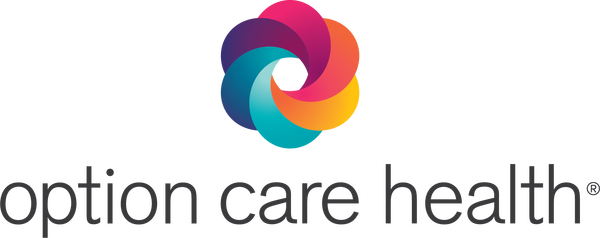
Option Care Patients Receiving Home Infusion of Immunoglobulin Benefit from Better Outcomes, Lower Costs
By: Option Care
November 12, 2015
SAN ANTONIO — Option Care patients treated with immunoglobulin (IG) therapy at home with a high level of clinical oversight had better outcomes compared to others receiving the therapy according to a first-of-its-kind study presented at the American College of Allergy, Asthma and Immunology (ACAAI) Annual Scientific Meeting this week. The researchers, who evaluated data from Option Care as compared to a large national database, also determined that the cost of therapy was lower. [*]Orange J, Kirkham H, Ayer G, et al. Improved clinical outcomes for patients receiving immunoglobulin therapy through specialty pharmacy or home infusion services. Paper presented at the American College of Allergy, Asthma and Immunology (ACAAI) 2015 Annual Scientific Meeting: Nov 5-9, 2015; San Antonio.
One of the nation’s largest providers of home and alternate treatment site infusion services, Option Care provides high-quality, high-touch clinical support to patients undergoing treatment for complex conditions, including those receiving IG. Option Care’s unique treatment model combines locally delivered care with nationally managed treatment protocols and outcomes data collection. Specially trained infusion nurses and pharmacists provide individualized, expert IG treatment and patient education in the home. Patient-reported outcome measures — a scientific way of capturing patient experience — are collected by a dedicated team of IG experts and shared with patient’s broader health care team to keep everyone on the same page about the patient’s health status and to optimize the treatment plan.
“We conducted this research to test the hypothesis that patients who receive higher levels of clinical care in the home end up having better outcomes, ” said Jordan Orange, M.D., Ph.D., lead investigator of the study and professor of pediatrics and immunology at Baylor College of Medicine in Houston. “We found that the provision of comprehensive and consistent care in a patient’s own home does indeed lead to better outcomes. And an added benefit was that it was actually more cost effective.”
IG therapy is provided to patients who have disorders of the immune system such as immune deficiencies or autoimmune diseases, including some neuromuscular disorders. The site of care for the treatment may be the hospital inpatient setting, a hospital outpatient infusion center, a physician’s office, a community infusion center or at home.
In the retrospective study from Aug. 1, 2011 to June 30, 2014, Dr. Orange and his colleagues assessed outcomes of Option Care patients receiving in-home IG therapy in comparison with control patients included in a large national administrative claims database (IMS Pharmetrics Plus). Patients received therapy one of two ways: intravenous IG (IVIG) in which it is injected directly into the bloodstream, and subcutaneous IG (SCIG), in which the therapy is injected just beneath the first layer of skin. Researchers matched each Option Care patient to four patients in the database: 227 Option Care IVIG patients were compared to 908 controls, and 59 Option Care SCIG patients were compared to 236 controls. Researchers found:
- Serious bacterial infections were lower in Option Care IVIG patients (.16 per patient per year) compared to control IVIG patients (.29 per patient per year)[*]Orange J, Kirkham H, Ayer G, et al. Improved clinical outcomes for patients receiving immunoglobulin therapy through specialty pharmacy or home infusion services. Paper presented at the American College of Allergy, Asthma and Immunology (ACAAI) 2015 Annual Scientific Meeting: Nov 5-9, 2015; San Antonio.
- Serious adverse events (renal impairment, hepatitis, anaphylaxis and aseptic meningitis) were lower in Option Care SCIG patients (.08 per patient per year) compared to SCIG control patients (.34 per patient per year). [*]Orange J, Kirkham H, Ayer G, et al. Improved clinical outcomes for patients receiving immunoglobulin therapy through specialty pharmacy or home infusion services. Paper presented at the American College of Allergy, Asthma and Immunology (ACAAI) 2015 Annual Scientific Meeting: Nov 5-9, 2015; San Antonio.
- Costs were lower overall for Option Care IVIG patients compared to controls ($112,756 vs. $120,567 per patient per year).[*]Orange J, Kirkham H, Ayer G, et al. Improved clinical outcomes for patients receiving immunoglobulin therapy through specialty pharmacy or home infusion services. Paper presented at the American College of Allergy, Asthma and Immunology (ACAAI) 2015 Annual Scientific Meeting: Nov 5-9, 2015; San Antonio.
“Delivering high quality care for all of our patients is our top priority. We believe that our high-touch care model benefits patients, and we are pleased that this IG data bears that out,” said Paul Mastrapa, CEO of Option Care. “Not only do our patients appreciate the quality of life benefits of receiving care in the home, this research shows they also are getting the best quality care at a lower cost.”
About the American College of Allergy, Asthma and Immunology (ACAAI)
The ACAAI is a professional medical organization of more than 6,000 allergists-immunologists and allied health professionals, headquartered in Arlington Heights, Ill. The College fosters a culture of collaboration and congeniality in which its members work together and with others toward the common goals of patient care, education, advocacy and research. ACAAI allergists are board-certified physicians trained to diagnose allergies and asthma, administer immunotherapy, and provide patients with the best treatment outcomes. For more information and to find relief, visit www.AllergyandAsthmaRelief.org.
About Option Care
Option Care Enterprises, Inc., formerly Walgreens Infusion Services, Inc., offers high quality clinical care provided by specially trained infusion nurses, pharmacists and dietitians who treat patients with a wide range of acute, chronic and rare conditions. As one of the nation’s largest providers of home and alternate treatment site infusion services, Option Care has 92 infusion pharmacies and 110 alternate treatment sites across the country. Learn more at www.OptionCare.com.
# # #
Media Contact Information
Option Care
Lauren Kotarski
312-558-1770
LKotarski@pcipr.com

